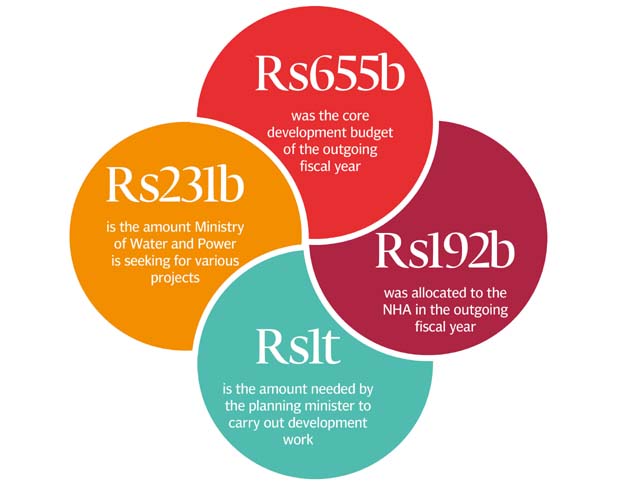Ministerial body looks to appease all departments in Rs700b
Finance ministry’s allocation of a fixed sum for FY18 may create problems

Finance Minister Ishaq Dar. PHOTO: FILE
The finance ministry’s insistence to allocate only Rs700 billion for core development needs for new fiscal year 2017-18 may create problems for those ministries that do not have say at the highest level in the power corridors, said sources in the Ministry of Planning.
SC takes finance ministry to task
The Rs700 billion indicative development budget ceiling is only 6.9% higher than the outgoing fiscal year’s Rs655 billion worth of core development budget. These amounts are exclusive of allocations for security and Prime Minister’s special schemes, which the government shows as part of development budget to claim higher than actual development spending.
For the outgoing fiscal year, the government had allocated Rs800 billion for the development budget including Rs145 billion for security and PM’s schemes. The Planning Ministry does not treat Rs145 billion as part of the core development budget, as it does not have control over releases against these allocations.
The Rs700 billion ceiling is equivalent to what the National Highway Authority (NHA) alone has demanded for next year including Rs500 billion for China-Pakistan Economic Corridor (CPEC) projects.

The formal process to approve financial year 2017-18’s development budget would begin on Tuesday with the first meeting of the Priorities Committee - the inter-ministerial body responsible to gauge these departments’ needs. On its first day, the committee would review the development and current expenditure needs of 17 government ministries and departments.
The secretaries of finance ministry, Economic Affairs Division and planning ministry sit in the Priorities Committee. However, at present there is no secretary planning after posting orders of Irfan Elahi were withdrawn last week.
The Priorities Committee does not discuss the defence budget that is decided at the level of General Headquarter and the finance minister.
Revenue reconciliation: Dar urges inter-ministry efficiency
However, like the previous year, this time again there is uncertainty over the size of the development budget due to demands for much higher allocations from agencies executing energy projects including nuclear and NHA, said the sources.
Besides other departments, these two important government institutions are seeking more than their indicated resources, they added. This would be one of the issues that Planning Minister Ahsan Iqbal would present to Prime Minister Nawaz Sharif during his meeting with the premier.
Last week, the planning minister said that he needs at least Rs1 trillion to carry out the development work in light of the priorities of the PML-N government.
However, there are chances that the Ministry of Finance, like the previous years, would prevail.
For the next fiscal year, the NHA has demanded Rs700 billion including Rs500 billion for CPEC projects. For the outgoing fiscal year, the government had allocated Rs192 billion to the NHA. During the first nine months, an amount of Rs166 billion was given to the authority for the development projects.
The total cost of the CPEC projects that are currently under construction in the public sector is Rs1.2 trillion and out of that the spending till June last year was only Rs180 billion, according to the planning ministry.
At the time of the last budget, the planning minister had sought roughly Rs350 billion for CPEC projects alone but he got only Rs129.8 billion.
Similarly, the Ministry of Water and Power is also seeking Rs231 billion for various power and water sector projects for the new fiscal year, said the sources.
RLNG connections approved
It was the highest priority of the government to completely eliminate load-shedding in the shortest possible time, said Prime Minister Nawaz Sharif on Monday while chairing a meeting of the Cabinet Committee on Energy.
The Cabinet Committee on Energy on Monday approved new Re-gasified Liquid Natural Gas (RLNG) based gas connections for domestic, industrial and commercial consumers. The government would also require additional resources to begin work on these projects ahead of upcoming general elections.
The recommendation of the Cabinet Committee on Energy regarding gas connections would be placed before Federal Cabinet for ratification on Wednesday.
Dar empowered to issue auxiliary budgets
The Priorities Committee places its recommendation on development budget in front of the Annual Plan Coordination Committee (APCC), which is headed by the minister for planning, development and reform and has the authority to make changes.
The APCC then gives its proposals to the National Economic Council, which is headed by the prime minister and has representation of all the federating units.
Published in The Express Tribune, April 11th, 2017.
Like Business on Facebook, follow @TribuneBiz on Twitter to stay informed and join in the conversation.



















COMMENTS
Comments are moderated and generally will be posted if they are on-topic and not abusive.
For more information, please see our Comments FAQ